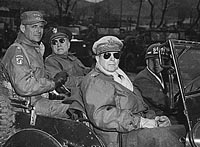 |
 |
 |
|||
 |
Home | Cold War Turns Hot | The Armed Forces Integrate | What the Experts Say | |||
|
The Cold War Turns Hot
"Mauled and Humiliated"
Fifty-three countries registered their support, and twenty-two of them offered troops and other help. But the U.S. would carry the main military load - something it wasn't prepared to do. Jack Goodwin of Waco, Texas was a 19-year-old private with the 21st Infantry, stationed on the Japanese island of Kyushu. "I was almost ready to come home when the war started," Goodwin recalls. "They told us we were going to Korea. We said, 'Where's that?'" Goodwin was among 406 infantry soldiers in Task Force Smith - the first Americans to reach Korea, on July 2nd, 1950. The men flew into South Korea, then boarded trains, then trucks, then finally walked, Goodwin says, to Osan, south of Seoul. "And that's where we dug in." On their way north, the Americans had passed fleeing South Korean soldiers and refugees. Task Force Smith's job was to take a position on a hill and slow the North Korean blitz until reinforcements could follow. War correspondent Marguerite Higgins of the New York Herald Tribune was the only woman to cover the Korean War up close. In a speech later that year she recalled walking on the morning of July 4th into "the muddy, flea-infested hut which held the battalion command post. General Barth, then assistant commander, strode into our hut with the news, 'Red tanks are heading this way.'" Higgins recalled that the general added confidently, "'Colonel Smith's battalion on up ahead is going to take them on. I'm confident that he can hold.'" But the men of Task Force Smith carried obsolete World War II weapons. And they were outnumbered ten to one. The North Koreans "come through with tanks," says then-GI Goodwin - new, Soviet-built tanks - "and that got us because we didn't have nothing to take out a tank. They just went right around us and started shooting us from the back. I got off the hill and got captured the next morning." Goodwin would spend more than three years in North Korean and Chinese prisoner-of-war camps. When the dead and missing were counted and a few survivors had drifted in, the commander of Task Force Smith found he'd lost 153 of his 406 infantrymen.
In a rare combat audio recording made by the U.S. Department of Defense program "Time for Defense," broadcast during the war on ABC radio, reporter Tom Flanagan captured the sounds of uncomfortably close artillery explosions followed by the screams of a South Korea soldier who'd been wounded in the leg. "This is getting a little too close for me," Flanagan said nervously into his microphone. In another recording, a battle-weary regimental commander complains, "the North Koreans have no consideration for loss of life. They have no hesitancy in losing five hundred lives to gain a small piece of ground." "I saw my countrymen mauled and humiliated," Higgins said near the end of 1950, "by a raggedy-tag army of Soviet-directed Orientals whom we had nicknamed "gooks" and earmarked as pushovers." For President Truman, the lesson of these humiliations was that America needed military might to match its role in the world. Speaking with reporters on his way to meet MacArthur on Wake Island a few months into the war, Truman said: "In one generation we've come from an isolated republic, to the position of the leadership of the world. And as the most powerful nation in the world, we have to assume world responsibilities." Congress agreed. U.S. military spending tripled during the three years of the Korean War and never again sank to pre-Korean War levels. Next: The Brothers Krepps See Combat
|
||||

